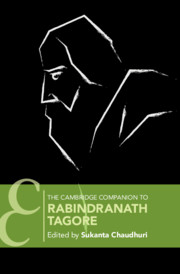Preface
Published online by Cambridge University Press: 24 December 2019
Summary
Rabindranāth Thākur (Tagore) has been a recognized figure in world literature for a hundred years and more, but the language that unlocked his genius has also hampered his global reception. Bengali is the world's seventh most widely spoken language but not a ‘world language’ in its cultural reach. The extent of Rabindranath's output has also told against him. The standard edition of his Bengali works runs to thirty-three large volumes and is still incomplete; his English works to four yet larger volumes but is also incomplete. Only a fraction of the Bengali writings has been translated into English, often (starting with his own versions) with more than the inevitable loss in translating great literature. Renderings in other languages, including most Indian ones, have been made from these English versions more often than not.
Thus when Bengalis claim for Tagore a place beside Dante, Shakespeare, and Goethe, their claim is predictably ascribed to cultural chauvinism, especially as shades of such chauvinism are sometimes quite apparent. His early international reputation subsided in a matter of decades. Even in India, his effective impact outside Bengal came to decline, despite the iconic status ensured by the Nobel Prize and continuing to this day. He has received some fresh attention since the late twentieth century, often for his writings and activities in other fields rather than his core literary output. However, the sweep and depth of his total achievement has scarcely been addressed – even across the entire body of scholarly work, let alone in a single exercise.
His non-literary enterprises, active and contemplative, would each have made the reputation of a lesser man: music, dance, and painting; social, historical, and political thought, with an impressive record of activism; radical thinking on education and rural development, embodied in an institution that started as a makeshift school with five students and is today a major university. Through his travels no less than his writings, he acquired standing as a global intellectual, if thereby often reducing himself to the figure of a spiritualist and ‘oriental sage’. More lastingly and materially, his historic association has transformed a remote Bengal village into a thriving academic centre, tourist destination, and, yet more improbably, an economic and administrative hub. Even Shakespeare's impact on Stratford-upon-Avon has not been transformative in so many ways.
- Type
- Chapter
- Information
- The Cambridge Companion to Rabindranath Tagore , pp. xiii - xivPublisher: Cambridge University PressPrint publication year: 2020



